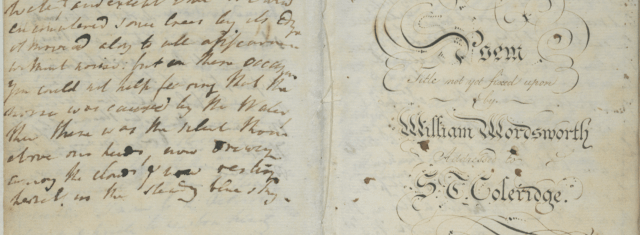Poetry According to William Wordsworth
Simon Bainbridge, Professor of Romantic Studies at Lancaster University, discusses the free online course "William Wordsworth: Poetry, People and Place", which was produced in partnership with the Wordsworth Trust at the great poet's home – Dove Cottage in the English Lake District.

How does a great poet write his poetry? And how important is the place where that poetry is written? To answer these questions, we based ourselves, for the making of this course, in the beautiful village of Grasmere in the English Lake District, which was home to William Wordsworth from 1799 to 1808.
Wordsworth was one of the greatest poets in English Literature. The volume Lyrical Ballads, which he published jointly with his friend and fellow poet, Samuel Taylor Coleridge, is a landmark volume. It is often seen as transforming English poetry and initiating the Romantic movement in Britain. His epic poem The Prelude was the first major autobiography in English and is now regarded as his masterpiece.
But how did Wordsworth write these great poems? What was his inspiration? What was he trying to achieve? And what were his processes of composition?
A magnificent collection of manuscripts
Working in Grasmere, Professor Sally Bushell of Lancaster University and Jeff Cowton of the Wordsworth Trust have explored these questions by looking at Wordsworth's own manuscripts. Sally is one of the world's leading scholars of how poems are written. Jeff is the curator of the Wordsworth Trust, Grasmere – the charitable organisation that preserves both the poet's home, Dove Cottage, and a magnificent collection of his manuscripts.
By examining different drafts, Sally and Jeff will tell the stories of how some of the greatest poems in the English language were written. By filming their investigations and discussions in the Jerwood Centre, the course will give you a virtual experience of what it is like to visit, and work in, one of the world's most important literary archives.
A poet of the outdoors
But our time in Grasmere over the last year has not only been spent in the archive. Wordsworth was a great poet of the outdoors, inspired by the magnificent scenery of the Lake District and even writing among his native mountains. So we've also been visiting and filming some of the key locations that inspired his poetry.
These include his school at Hawkshead; the lake of Ullswater, where he experienced one of his most important "spots of time"; and Greenhead Gill, where he set his moving tale of a Lakeland shepherd, "Michael".
Our on-location films have been designed to give you a sense of what it is like to read and discuss Wordsworth's poetry in the places that inspired it and where it was composed.
Not always lonely as a cloud
Though Wordsworth is probably best known for a poem that begins "I wandered lonely as a cloud" ("Daffodils"), our course also shows how essential other people were to him and to the way he wrote poetry. Particularly important here was his younger sister, Dorothy, who was herself an important writer.
My colleague, Professor Sharon Ruston, will introduce Dorothy and investigate the relationship between the siblings' writing, while Kate Ingle will explore the wider circle of friends of which they were a part.
The loveliest spot ever found
Those of us involved in making "William Wordsworth: Poetry, People and Place" over the past year have felt highly privileged to work in the environment of Grasmere, surrounded by the Lake District's inspiring scenery and with access to the Wordsworth Trust's magnificent manuscript collection.
Spending time in the location that Wordsworth described as "the loveliest spot that man hath ever found" has given us a real sense of the importance of place to some of the greatest poetry in English literature. The opportunity to handle the poet's actual manuscripts and to benefit from Jeff Cowton's expertise has given us an enhanced understanding of how Wordsworth actually wrote his poetry.
We hope that you will get a strong sense of these very special experiences – and may even be inspired to visit Grasmere itself!
To find out more, join the free online course "William Wordsworth: Poetry, People and Place" now or join the conversation using #FLwordsworth.
Poetry According to William Wordsworth
Source: https://www.futurelearn.com/info/blog/william-wordsworth-how-does-a-great-poet-write-his-poetry